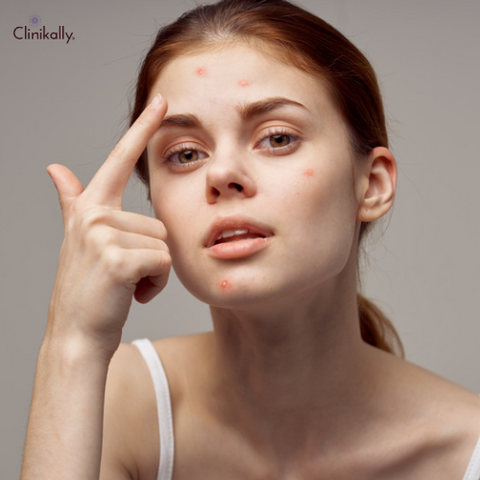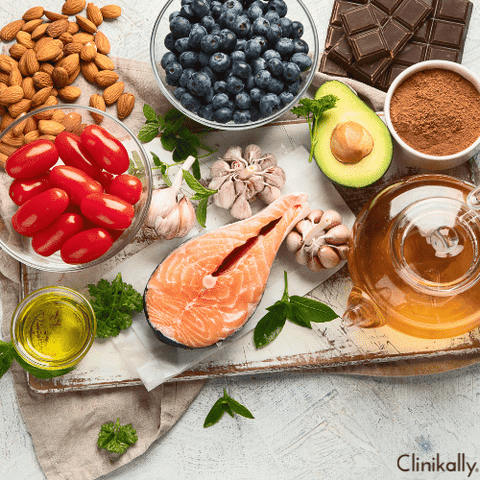Acne can be a frustrating and challenging skin condition to deal with, affecting people of all ages and genders. While acne is often thought of as a cosmetic issue, it can also have a significant impact on a person's self-esteem and mental health. Fortunately, there is growing evidence to suggest that dietary factors can play a crucial role in acne development and severity.
In recent years, researchers have uncovered many connections between our diets and skin health, including the link between certain foods and acne. For example, studies have found that consuming high-glycemic-index foods, such as sugary snacks and refined carbohydrates, can lead to increased sebum production and inflammation, both of which can contribute to acne. Conversely, diets rich in anti-inflammatory foods like leafy greens, berries, and fatty fish have been shown to have a protective effect on skin health.
Beyond individual foods, nutritional deficiencies can also play a role in acne development. For example, low levels of vitamin D and zinc have been linked to increased acne severity, while adequate intake of vitamin A and omega-3 fatty acids can have a beneficial effect.
In this blog post, we will explore the latest research on the relationship between diet and acne, providing practical tips and advice for optimizing your diet to support clear, healthy skin. We will cover the best and worst foods for acne-prone skin, nutrient deficiencies to watch out for, and strategies for incorporating skin-friendly foods into your diet. By the end of this article, you will have a better understanding of how your diet impacts acne and the steps you can take to achieve clear, glowing skin.
Understanding the Link Between Diet and Acne

Acne is a common skin condition that affects millions of people worldwide. While there are many factors that can contribute to the development of acne, diet is one that has been increasingly studied in recent years. The relationship between diet and acne has long been debated, with some claiming that there is no correlation, while others argue that there is a clear link. In this article, we will delve into the scientific evidence behind the connection between diet and acne, exploring the foods and nutrients that have been linked to acne development and discussing strategies for maintaining clear, healthy skin through dietary choices.
The Role of Nutrition in Acne Development
Diet is an essential factor in maintaining overall health and well-being, and it can also influence skin health. Consuming a well-balanced diet rich in vitamins, minerals, and antioxidants can help prevent acne by supporting the immune system and reducing inflammation. However, certain foods can trigger acne by causing hormonal imbalances, increasing inflammation, or worsening existing skin conditions.
Hormonal Imbalances and Acne
Hormonal acne, which is often caused by an excess of androgens (male hormones), can lead to increased sebum production and clogged pores. Consuming foods that cause spikes in insulin and blood sugar levels can further exacerbate hormonal imbalances. These foods include refined carbohydrates, sugar, and high-glycemic index foods.
Inflammation and Acne
Inflammation is a critical factor in the development of acne. A diet high in inflammatory foods can contribute to skin inflammation, leading to acne breakouts. Some common inflammatory foods include refined sugars, unhealthy fats, and processed foods.
Foods to Eat and Avoid for Clear Skin

Clear and healthy skin is something that many of us strive for, but achieving it can sometimes feel like an elusive goal. While there are many factors that can impact skin health, diet is one that plays a significant role. The foods we eat can either contribute to or alleviate skin issues like acne, inflammation, and aging. With so much conflicting information out there about what to eat and what to avoid, it can be challenging to know where to start. In this article, we will explore the foods that can promote clear, healthy skin and those that can exacerbate skin issues. From nutrient-rich superfoods to common dietary culprits, we will provide actionable tips and strategies for optimizing your diet to achieve the radiant, glowing skin you desire.
The Best Foods for Clear Skin
A clear skin diet should be rich in anti-inflammatory foods, antioxidants, and essential nutrients. Some of the best foods for clear skin include:
-
Omega-3 fatty acids: Found in fatty fish, walnuts, and flaxseeds, omega-3 fatty acids have anti-inflammatory properties that can help reduce acne breakouts.
-
Antioxidants: Foods rich in antioxidants, such as berries, dark chocolate, and leafy greens, can help combat free radicals and support skin health.
-
Zinc: Oysters, legumes, and nuts are good sources of zinc, which plays a crucial role in skin repair and wound healing.
-
Low glycemic index foods: Whole grains, fruits, and vegetables help maintain stable blood sugar levels and can prevent insulin spikes that may trigger acne.
-
Probiotics: Fermented foods like yogurt, sauerkraut, and kimchi promote a healthy gut, which can contribute to clearer skin.
Foods That Trigger Acne
Foods that may trigger acne include:
-
Sugar: Excessive sugar consumption can lead to inflammation and insulin spikes, both of which can contribute to acne development.
-
Dairy: Some studies suggest that dairy products, particularly skim milk, can worsen acne in certain individuals.
-
High-glycemic index foods: Foods that cause rapid spikes in blood sugar, such as white bread, can contribute to acne by causing hormonal imbalances.
-
Processed foods: These foods are often high in unhealthy fats, sugars, and additives that can promote inflammation and acne.
Nutritional Deficiencies That Can Lead to Acne
Vitamin deficiencies can contribute to acne by impairing immune function, increasing inflammation, and affecting hormonal balance. Some common deficiencies linked to acne include:
-
Vitamin A: Crucial for skin health, a deficiency in vitamin A can lead to dry skin and increased acne breakouts.
-
Vitamin D: Involved in the production of collagen, vitamin D deficiency can weaken the skin's barrier function and contribute to acne.
-
Vitamin E: This antioxidant helps protect the skin from free radicals and inflammation. A deficiency can result in increased oxidative stress, leading to acne breakouts.
-
Vitamin B5 (pantothenic acid): A deficiency in this B-vitamin can lead to excess sebum production and acne breakouts.
-
Zinc: As mentioned earlier, zinc is crucial for skin repair and wound healing. A deficiency can result in slower healing of acne lesions and increased inflammation.
Tips for a Healthy and Glowing Skin Diet

Achieving healthy and glowing skin requires more than just a skincare routine. While topical treatments can certainly help, true skin health starts from within - with the foods we eat. A healthy and balanced diet can provide the nutrients and antioxidants necessary to protect and nourish our skin, promoting a clear, radiant complexion. But with so many conflicting opinions on what constitutes a "skin-friendly" diet, it can be challenging to know where to start. In this article, we will share practical tips and advice for creating a diet that promotes healthy, glowing skin. From incorporating nutrient-dense foods to avoiding common dietary pitfalls, we will cover everything you need to know to nourish your skin from the inside out.
Hydration and Acne Prevention
Proper hydration is essential for overall health and can help prevent acne by flushing toxins from the body, maintaining skin elasticity, and reducing inflammation. Aim to drink at least eight glasses of water per day, and consider incorporating water-rich fruits and vegetables, such as cucumbers and watermelon, into your diet.
The Gut-Skin Connection
A healthy gut is crucial for clear skin. Imbalances in gut bacteria can lead to inflammation and immune system dysfunction, both of which can contribute to acne. Incorporate probiotics, fiber-rich foods, and a diverse range of fruits and vegetables into your diet to support a healthy gut.
Supplements and Nutrients for Clear Skin
In addition to a balanced diet, certain supplements and nutrients can help support clear skin. Consider incorporating the following into your skincare routine and diet:
-
Vitamin A: Retinoids, derived from vitamin A, can help unclog pores and reduce inflammation.
-
Vitamin C: This powerful antioxidant can help brighten the skin and promote collagen production.
-
Niacinamide: A form of vitamin B3, niacinamide can help reduce inflammation, improve skin texture, and regulate sebum production.
-
Green tea extract: Rich in antioxidants and anti-inflammatory compounds, green tea extract can help reduce redness and inflammation associated with acne.
In conclusion, a well-rounded diet that focuses on anti-inflammatory foods, essential nutrients, and proper hydration can significantly impact acne-prone skin. By understanding the role of nutrition in acne development and incorporating the right foods and supplements into your diet, you can pave the way for clear, glowing skin. Remember that every individual's skin is unique, and it may take time and experimentation to find the best diet and skincare routine for your specific needs.
It is also essential to keep in mind that diet alone cannot solve all skin issues, and it should be combined with a comprehensive skincare routine, including gentle cleansing, moisturizing, and sun protection. Additionally, reducing stress, getting enough sleep, and exercising regularly can also benefit skin health and overall well-being.
While it can be tempting to turn to quick-fix solutions like harsh topical treatments or fad diets, these approaches can often do more harm than good in the long run. Instead, focus on creating sustainable lifestyle changes that support your skin's health and overall wellness.
In summary, taking a holistic approach to skincare that includes a healthy and balanced diet, regular exercise, and self-care can help you achieve the clear, glowing skin you desire. By nourishing your body from the inside out and treating your skin with gentle care and attention, you can enjoy the benefits of healthy, radiant skin for years to come.
















